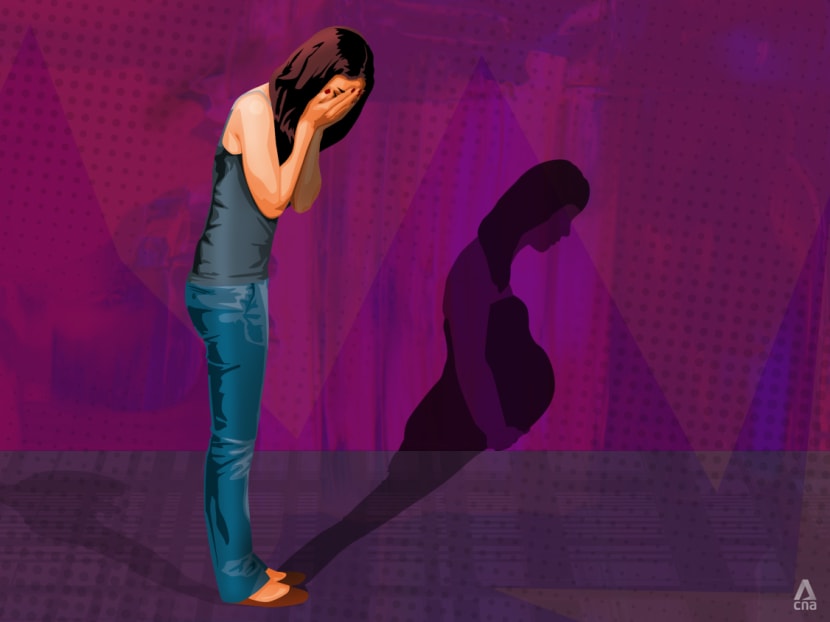The anguish of early miscarriage: Couples shouldn't rush the grieving process, experts say

(Illustration: Rafa Estrada)
SINGAPORE: Delivering her foetus after a miscarriage and then fishing it out from the toilet bowl so she could give it to the hospital for testing was the single most traumatising experience in Ms Amanda Tan’s (not her real name) life.
After she found out in March last year that her baby's heart had stopped beating, Ms Tan decided to let nature take its course instead of using medical intervention to complete the miscarriage.
Ms Tan, who works in advertising and is in her late 30s, was then in the first trimester of her pregnancy. She wanted to know that she and her husband of five years had done all that they could for the baby, she told CNA.
She was also so “deep in grief” that she wanted to hold on for as long as she could and see her pregnancy through to its end.
“You always think that you're going to have the amazing baby shower, the gender reveal or whatever. And you're going to be able to buy those cute cards that tell you how many weeks (of pregnancy) you're at,” she said.
“It's like the loss of a lot of dreams and a lot of hopes that you had for your longed-for child ... Nothing can prepare you, especially if you have a natural miscarriage at home.”
She was in “utter despair” for weeks and cried constantly. She thought she would never recover.
When she looked for support from those around her, some were quick to try and help. At least the baby was not fully formed, they would say, or at least she didn't discover something was wrong after giving birth.
"I get where people are coming from but … I don't think that that's necessarily helpful in the healing journey of a grieving parent," she said.
Although therapy has always been part of her life, and she considers herself to be a mental health advocate, Ms Tan found it “really hard” to talk about her grief over her miscarriage, she said.
“I know therapy is good and I would go for it normally, but actually after my miscarriage, I had no words, I was just so deep in grief and in depression.”
How common is miscarriage and what causes it?
At KK Women’s and Children’s Hospital (KKH), about 15 to 20 per cent of pregnancies end up in a miscarriage, said Professor Tan Hak Koon, chairman of the Division of Obstetrics and Gynaecology at the hospital.
Most pregnancy losses occur before the first trimester of pregnancy, which is before the 12th week, said Prof Tan.
About 3 per cent of women will miscarry after nine weeks of pregnancy, and less than 2 per cent beyond the 12th week of pregnancy, added Dr Arundhati Gosavi, consultant in the Division of Maternal Fetal Medicine, Department of Obstetrics and Gynaecology.
The most common symptoms of a miscarriage are vaginal bleeding and menstrual cramp-like pain, she added.
Currently, most miscarriages do not get investigated for the cause, said fertility specialist Dr Lim Min Yu.
“However, studies have shown that the most common cause is chromosomal abnormality. These happen by chance,” he said.
Some lifestyle choices, such as taking illicit drugs. smoking or drinking alcohol heavily also increase the risk of miscarriage.
Prof Tan said that medical conditions such as uncontrolled severe diabetes, hyperthyroidism or autoimmune disease also raise a woman’s risk of miscarriage. Other contributory factors include "advanced" maternal and paternal age, previous history of miscarriage, low blood progesterone levels during early pregnancy.
Leading a healthy lifestyle helps to improve chances of a normal pregnancy, Prof Tan said, adding that this includes having a balanced diet, exercising regularly and reducing stress.
If the woman experiences more than two miscarriages, she would benefit from a further assessment with an obstetrician and gynaecologist, he said.
Dr Gosavi said that couples could attend a preconception clinic or visit a gynaecologist before attempting to get pregnant. They should also make "positive lifestyle behavioural choices", get folic acid supplements and appropriate vaccination.
GRIEVING AN EARLY MISCARRIAGE
The grief that couples go through following an early miscarriage is “one of the most underestimated things”, said Dr Kamini Rajaratnam, a psychiatrist with an interest in perinatal psychiatry.
“When they miscarry so early, people expect them not to grieve because it wasn't a baby. But for them it was a baby,” she said.
“They saw a pregnancy test kit. They rejoiced, they celebrated it. They might even have planned a life with this baby.”
Ms Linda Van Laer, a counsellor with a special interest in supporting the mental health of new and expectant parents, said that mourning a miscarriage can be “just as severe” as mourning the loss of a baby that lived.
Five to 10 per cent of her clients approach her because they are struggling after a miscarriage, she said.
Sometimes, her clients come to her when they get pregnant after a miscarriage because they notice that they have anxiety over their new pregnancy.
“There's still so much secrecy and stigma around miscarriage,” she said, pointing to the culture of keeping the pregnancy hush-hush until the first trimester is over, and there is a higher chance the baby is safe.
Ms Ang Lee Beng, a medical social worker at KKH, similarly said that while miscarriages are common, the loss may be invisible to people around the couple.
“Often, their families or friends also may not understand the depth of the couple's loss,” she said.
Ms Ang, who is also chairperson of the KKH bereavement support committee, said that women who miscarry early may have limited opportunities to mourn their loss and may be expected to move on. They may suffer in isolation, she said.
Sometimes, couples are also reluctant to disclose their miscarriages to their families and friends who may not understand the significance of their loss.
“Given the acuteness of the pregnancy crisis, the grief-stricken parents go through an emotional rollercoaster. Feelings include initial panic, fear, shock, anger,” she said.
Some may feel guilty and blame themselves for not being attentive to their symptoms or body, and question whether the outcome would have been different if they had come to the hospital earlier.
TAKING TIME TO GRIEVE
Miscarriage in the early stages does not mean that the grief is shorter or easier to handle compared to one in later pregnancy, Ms Ang said.
“One should not rush through the process by thinking that ‘I should have gotten over it by now’, especially when people around them seem to have returned to normal.”
It is also common that one may feel fine one day and lousy the next day. Bereaved parents need to remember that it is normal to experience shock, confusion and feelings of extreme pain and suffering, she added.
“Many of these feelings can be frightening but parents must realise that it is normal and natural to be overwhelmed with the complexities of these emotions. Hence they need to be gentle and patient with themselves.”
The most important thing women who miscarry in the early stages need to do is just to let themselves grieve, Dr Kamini said.
“Give yourself space and time to mourn your loss,” she said.
The time needed to get over the loss varies – contrary to popular belief, there is no timeline for grief, said Dr Cornelia Chee, head of the Department of Psychological Medicine at National University Hospital (NUH).
“In general, one usually experiences a lessening of tearfulness, memories of the loss and aching for the lost baby as time goes by,” said Dr Chee, who is also programme director of the hospital’s Women’s Emotional Health Service.
However, the experts said that those who are unable to cope with their grief should seek professional help.
HOW TO SUPPORT COUPLES WHO HAVE MISCARRIED
People may find it difficult to bring up or talk about the loss with the couple as they do not know how to, Ms Ang said.
“This may result in the bereaved parents feeling isolated or rejected as their loss seems like a non-event and is not recognised,” she said.
What they need is a listening ear and validation of their experiences and feelings, she said, adding that loved ones can offer practical help such as assisting with meals.
Avoid saying things like “you are still young”, “you can have another one”, “at least you already have one child” to a woman who has miscarried, she said.
“To the bereaved mothers, the baby that they have lost is special and irreplaceable."
Dr Kamini said that supporting a woman who has miscarried is about helping her sit with her feelings.
"The number one thing that they need is this permission to grieve, permission to cry, somebody who will just sit next to them and say 'yeah, this is really, really devastating and I am also sad and I'll be here. You cry if you need to,'" she said. "So maybe, less talking, more showing up."
The grief of fathers is often overlooked because he did not physically go through the miscarriage, said Ms Van Laer.
“There's more stigma in men grieving openly, so to see them crying over a miscarriage is more unusual. He might think he needs to contain his feelings.”
Dr Chee agreed that husbands rarely ask for help.
“Husbands tend to grieve differently and this should be recognised. They may need more time alone, or find that giving support to their wives actually helps them recover from their own grief too.”
For Ms Tan, talking to other mums who went through pregnancy loss did not help as their experiences were not the same as hers. The only one who could support her was her husband.
“We were truly in the eye of the hurricane together.”







